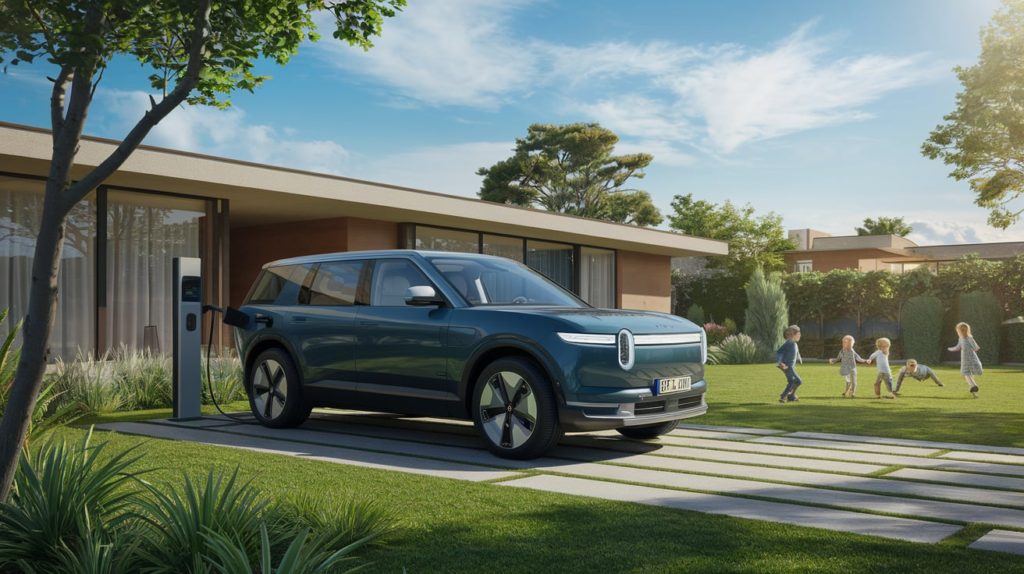Electric vehicles (EVs) are taking the automotive world by storm, and one segment that’s gaining rapid popularity is electric SUVs. Combining the spaciousness and versatility of traditional SUVs with the environmental benefits of electric power, these vehicles are reshaping how families view road travel. But are they truly the future of family cars? Let’s dive into the features, advantages, challenges, and key models driving this trend.

Why Are Electric SUVs So Popular?
1. Family-Friendly Features
- Ample cabin space for passengers and cargo.
- Advanced safety systems like adaptive cruise control and 360-degree cameras.
2. Environmental Benefits
- Zero tailpipe emissions reduce carbon footprint.
- Often eligible for tax credits and green incentives.
3. Cost Savings
- Lower fuel costs compared to gas-powered SUVs.
- Reduced maintenance due to fewer moving parts in EVs.
4. Enhanced Driving Experience
- Instant torque for smooth acceleration.
- Quieter rides, perfect for long family trips.
Top Electric SUVs on the Market
1. Tesla Model Y
- Range: 330 miles
- Highlights: Autopilot, roomy interior, and Tesla’s Supercharger network.
- Ideal For: Tech-savvy families who prioritize range and innovation.
2. Ford Mustang Mach-E
- Range: 300 miles
- Highlights: Sporty design, advanced infotainment, and solid cargo space.
- Ideal For: Families looking for a blend of style and practicality.
3. Hyundai Ioniq 5
- Range: 303 miles
- Highlights: Futuristic design, fast charging, and spacious rear seats.
- Ideal For: Families wanting affordable luxury.
4. Rivian R1S
- Range: 316 miles
- Highlights: Rugged design, off-road capability, and premium interior.
- Ideal For: Adventurous families who love road trips.
5. Kia EV9 (Upcoming)
- Range: Estimated 300 miles
- Highlights: Roomy third-row seating, bold styling, and cutting-edge tech.
- Ideal For: Larger families seeking space and functionality.
Advantages of Electric SUVs for Families
| Feature | Electric SUVs | Traditional SUVs |
|---|---|---|
| Fuel Cost | Lower (electricity is cheaper) | Higher (gasoline dependency) |
| Emissions | Zero tailpipe emissions | High CO2 emissions |
| Noise Levels | Quiet operation | Louder engine noise |
| Maintenance | Fewer moving parts, lower cost | Expensive due to complex engines |
Challenges Facing Electric SUVs
1. Higher Initial Cost
Many electric SUVs come with a higher price tag than traditional counterparts. However, incentives and long-term savings often offset this cost.
2. Charging Infrastructure
While public charging stations are expanding, range anxiety remains a concern for many buyers, especially in rural areas.
3. Battery Degradation
Over time, battery performance may decline, though advancements in technology are improving longevity.
Future Trends for Electric SUVs
- Increased Range: Expect vehicles offering over 400 miles per charge as battery tech improves.
- Affordable Options: More budget-friendly models from major automakers.
- Sustainable Materials: Interiors made with eco-friendly materials like recycled plastics and vegan leather.
- Vehicle-to-Grid (V2G) Tech: EVs that can power homes during outages.
FAQs
1. Are electric SUVs suitable for long trips?
Yes! With increasing charging stations and ranges exceeding 300 miles, many electric SUVs are great for road trips.
2. How much do electric SUVs cost?
Prices vary, but they generally start at $40,000 and go up depending on features and range.
3. Do electric SUVs have enough space for families?
Absolutely. Models like the Tesla Model Y and Rivian R1S offer spacious interiors and ample cargo room.
4. How long does it take to charge an electric SUV?
Charging time depends on the charger type. A fast charger can provide 80% charge in 30–40 minutes.
5. Are electric SUVs reliable in cold weather?
While cold weather can slightly reduce battery efficiency, modern EVs are designed to perform well in various climates.
Conclusion
Electric SUVs are not just a trend—they are paving the way for sustainable, cost-effective, and family-friendly travel. With their unmatched features and growing acceptance, these vehicles represent the future of family cars. Whether you’re planning your next road trip or a daily commute, an electric SUV might be the perfect companion.

